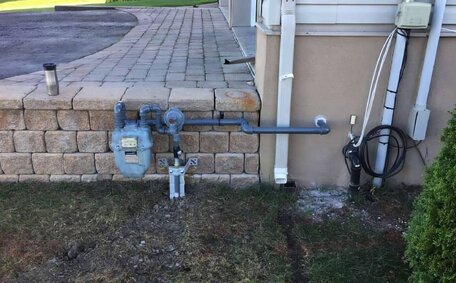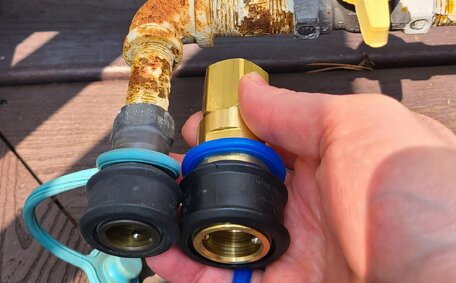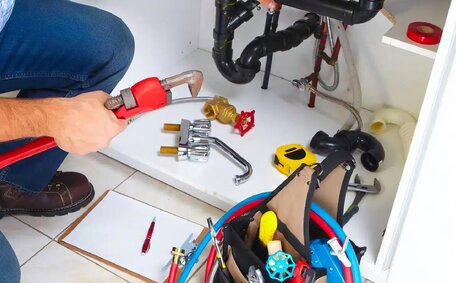How Tankless Water Heaters Work
Tankless water heaters, also termed on-demand heaters, operate distinctly from traditional storage tank models. Here’s how they operate:
- When you turn on a hot water tap, cold water travels directly into the tankless unit, eliminating the need for a traditional storage water tank.
- Inside, water moves through a heat exchanger, a modern advancement allowing for superior heating compared to traditional methods.
- This appliance delivers hot water on demand, without the need to continuously heat a tank. Tankless units are designed to heat water on demand, only when you need it, which promotes energy-efficient usage.
- Tankless heaters can employ intermittent ignition devices (IIDs) to ensure a continuous hot water supply during power outages, avoiding constant pilot light use.
Benefits of Tankless Water Heaters
Tankless water heaters offer several key advantages over traditional storage tank water heaters:
- Uninterrupted Hot Water Supply – A tankless heater ensures a steady flow, eliminating concerns of running out of hot water, even with simultaneous use from different outlets.
- Energy & Cost Savings – Tankless units are more energy-efficient, often yielding over 30% in energy savings compared to traditional heaters. Their operation minimises energy waste, potentially saving homeowners around $100 each year.
- Compact Design – Tankless systems require roughly 25% of the space needed by traditional models, providing versatile installation options.
- Durability – With fewer components and smart technologies like flow sensors, tankless heaters can last over 20 years, usually with a comprehensive home warranty.
- Eco-Friendly – With less standby heat loss, tankless heaters contribute to reduced CO2 emissions throughout their life cycle.
With benefits like unlimited hot water, lower energy bills, and longevity, tankless water heaters offer homeowners a green, money-saving upgrade over other hot water systems.
Energy and Cost Savings
One of the biggest advantages of tankless hot water heaters is their exceptional energy efficiency and the significant cost savings realised over time. Do tankless water heaters measure up in efficiency? Absolutely, with energy factors (EFs) of 0.80 or higher, they use over 80% of the energy supplied, unlike many other models. The higher the EF, the more efficient the unit. In comparison, one might wonder how much more efficient tankless heaters are, since storage tank water heaters average an EF around 0.60.
This enhanced efficiency translates into considerable energy and cost savings, even more so than electric counterparts in numerous homes. Households could see up to 50% in energy bill savings with electric tankless water heaters compared to conventional units.
Heating water with your water heater accounts for roughly 18% of a home’s total energy usage. By upgrading to a tankless system with an EF of 0.95 or higher, you can minimise your water waste, cut your energy bills substantially, and lower your carbon footprint simultaneously.
Space-Saving Design
One of the biggest advantages of tankless water heaters is their compact size compared to conventional storage tank models. Tankless heaters alleviate space concerns, typically needing only 25% of the space used by a tank-style heater. For instance, a standard tankless gas heater takes up substantially less space.
Comparatively, a gas tankless model may only occupy a 35 cm by 55 cm footprint – smaller than a standard kitchen cabinet.
Such space efficiency derives from forgoing the large hot water storage tanks inherent to traditional heaters. Tankless heaters can easily be mounted on walls to maximise floor space. With their adaptable design, these units fit your home’s contours perfectly, ideal in Marsfield where space might be at a premium.
The smaller overall size gives homeowners much more flexibility when it comes to installation locations, especially in tight spaces.
Commercial properties benefit from the reduced size of modern tankless systems, differing significantly from the larger traditional models. Compact wall-mounted units require less square footage to operate, leaving maximum room for business activities and inventory storage. With ondemand hot water taking up minimal space, retrofitting commercial water heating to an energy-efficient tankless system is a savvy, space-smart move.
Downsides of Tankless Water Heaters
While there are clear benefits like energy savings and a reduced footprint, it’s important to consider certain drawbacks of tankless models:
- Higher Upfront Cost – Purchasing a tankless unit involves a higher initial cost compared to a conventional storage tank heater. The intricacies of installing tankless units may pose a more complex challenge compared to conventional storage water heaters.
- Longer Wait Time – Tankless heaters take approximately 20-30 seconds to sense water flow and start heating water. This brief pause may result in a sudden surge of cold before the heated water progresses through unit to your faucets.
- Frequent Maintenance – Hard water must be managed to avert mineral deposits that can lead to buildup in the heat exchanger. Annual inspections are recommended to maintain tankless systems’ efficiency.
Contemplating what you need to know before investing in tankless water units will aid in evaluating if the benefits outweigh the initial higher cost and increased maintenance.
Comparing Tankless and Conventional Water Heaters
When it comes to choosing between a cutting-edge tankless or a traditional type water heater, there are several key differences to consider:
Lifetime Expectancy
Natural gas tankless water heaters can last over 20 years with proper maintenance, thanks to durable components and advanced features such as flow sensors. In contrast, traditional storage water heaters typically need replacement after 10-15 years.
Energy efficiency
Tankless units are over 30% more efficient with higher Energy Factors (EF). For instance, gas tankless water heaters average an EF of 0.80+ versus 0.60 for tank storage heaters.
Hot Water Delivery
A traditional storage tank heater maintains a supply of hot water for immediate use, though this reserve is limited. Although tankless heaters may take 20-30 seconds to reach the set water temperature, they can provide consistent hot water thereafter.
Tankless Conventional
| Initial Cost | Higher | Lower |
| Lifetime | 20+ years | 10-15 years |
| Efficiency | Higher EF | Lower EF |
| Maintenance | More frequent | Less frequent |
Making the Right Choice for Your Home
Multiple factors should be considered when deciding if tankless water heaters are right for your dwelling:
Household Size & Hot Water Usage
If your household uses a significant amount water, tankless models are ideal, with optimal flow rates ensuring a continuous supply on demand. Gauge your home’s average hot water demand and see how it measures up against the tankless units’ flow rates.
Available Fuel Source
Before you opt for a tankless unit, it’s crucial to ensure your dwelling has ample electrical capacity or is poised for gas electric water line connections. Maintenance needs also differ between gas and electric models.
Space Constraints
The compact, wall-mounted design of tankless systems makes them perfect when floor space is limited. Just ensure accessible mounting locations near plumbing lines.
Upfront Costs
While energy savings over time offset tankless heaters’ higher initial investment, be sure to factor purchase and installation costs into your budget.
Contact our Marsfield plumbing experts who can tailor a tankless water system to meet your household’s particular needs. We’ll assess your household’s hot water requirements and fuel availability to determine if a tankless upgrade makes good financial sense and provides enough flow for your needs.
Contact Marsfield Plumbing to Learn More
For expert advice on whether a tankless water heater is right for your Marsfield home, contact our professional plumbing specialists at Marsfield Plumbing today. With a solid decade of service in Marsfield, we’ve honed the expertise to discern what’s right your household’s unique hot water needs and recommend the most fitting, efficient system.
To learn more or book a no-obligation consultation with our tankless water heating experts, call us at 1300 349 338 or email jobs@marsfieldplumbingservices.com.au.
We’ll thoroughly evaluate factors like your average daily hot water usage, available fuel sources, space constraints, and budget to determine if upgrading to tankless makes good sense.
As a licenced, insured and experienced plumbing company, Marsfield Plumbing can help with complete tankless water heater installations, providing expert care while minimising disruption to your home or business. We also provide annual maintenance and repairs to keep your new hot water tankless systems running at peak efficiency for 20+ years.
Upgrade to a modern tankless hot water system to avoid the inconvenience of cold showers and high energy costs. Get in touch with Marsfield Plumbing today to harness the money-saving, eco-friendly advantages of a superior tankless water system!






